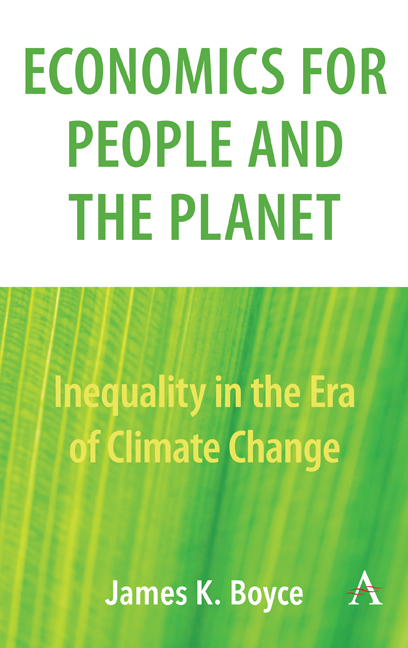Book contents
- Frontmatter
- Contents
- List of Illustrations
- Acknowledgements
- Part I Rethinking Economics and the Environment
- Chapter 1 Limits to Growth–of What?
- Chapter 2 The Twin Tragedies of Open Access
- Chapter 3 Pursuing Profits–or Power?
- Chapter 4 Rent in a Warming World
- Chapter 5 Universal Assets for Universal Income
- Chapter 6 Universal Basic Income: Six Questions
- Chapter 7 Environmentalism's Original Sin
- Chapter 8 Rethinking Extinction
- Part II Environmental Injustice
- Part III Climate Policy
- Notes
- Publication History
- Index
Chapter 3 - Pursuing Profits–or Power?
from Part I - Rethinking Economics and the Environment
Published online by Cambridge University Press: 12 February 2019
- Frontmatter
- Contents
- List of Illustrations
- Acknowledgements
- Part I Rethinking Economics and the Environment
- Chapter 1 Limits to Growth–of What?
- Chapter 2 The Twin Tragedies of Open Access
- Chapter 3 Pursuing Profits–or Power?
- Chapter 4 Rent in a Warming World
- Chapter 5 Universal Assets for Universal Income
- Chapter 6 Universal Basic Income: Six Questions
- Chapter 7 Environmentalism's Original Sin
- Chapter 8 Rethinking Extinction
- Part II Environmental Injustice
- Part III Climate Policy
- Notes
- Publication History
- Index
Summary
In corporations, the pursuit of power often trumps the pursuit of profits.
Do corporations seek to maximize profits? Or do they seek to maximize power? The two may be complementary–wealth begets power, power begets wealth–but they're not the same. One important difference is that profits can come from an expanding economic ‘pie’, whereas the power often is a zerosum game: more for me means less for you. And for corporations, the pursuit of power sometimes trumps the pursuit of profits.
Power versus Profits
Take public education, for example. Greater investment in education from preschool through college could increase the overall pie of economic well-being. But it also would narrow the educational advantage of corporate oligarchs and their privately schooled children–and diminish the power that comes with it. Although corporations could benefit from the bigger pie produced by a better-educated labor force, there's a tension between what's good for business and what's good for the business elite.
Similarly, the business elite often supports economic austerity instead of full-employment policies that would increase growth and profits. This may have something to do with the fact that austerity widens inequality, while full employment narrows it by empowering workers. If we peel away the layers of the onion, at the core again we find that those at the top of the corporate pyramid put power before profits.
As one more example, consider the politics of government regulation. Corporations routinely pass along to consumers whatever costs they incur as a result of regulation. In the automobile industry, for instance, the regulations that mandated seat belts, catalytic converters and better fuel efficiency added a few hundred dollars to the price of a vehicle. They didn't cut automaker profit margins. If the costs are ultimately borne by consumers, why do regulations face such stiff resistance from the corporations? The answer may have less to do with profits than with power. Corporate chieftains are touchy about their ‘management prerogatives’. They simply don't like other folks telling them what to do.
Corporate Power versus Government Power
In a famous 1971 memorandum to the US Chamber of Commerce, future Supreme Court Justice Lewis Powell wrote, ‘The day is long past when the chief executive office of a major corporation discharges his responsibility by maintaining a satisfactory growth of profits.
- Type
- Chapter
- Information
- Economics for People and the PlanetInequality in the Era of Climate Change, pp. 9 - 12Publisher: Anthem PressPrint publication year: 2019



